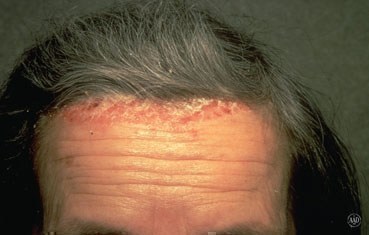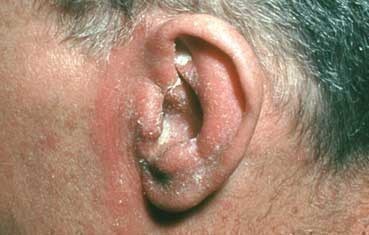
Skin conditions that cause scalp irritation such as itchy rash on scalp can be painful. And, with an inflamed scalp, these conditions can lead to head rashes.
Do not scratch your scalp with your fingernails.
Scalp conditions range from mild to serious and should be treated accordingly. Also, you will notice other symptoms and feel the need to scratch. Being conscious of these signs will be useful in identifying the condition that’s affecting your scalp.
Scalp Rashes Causes & Treatments
This post will focus on two known skin conditions that generally cause an itchy rash on scalp. We’ll briefly cover what you can expect from each condition and help you identify the symptoms.
More importantly, we’ll discuss treatment or what to do to minimize the effects of a scalp rash. Getting relief from the itching sensation is important because scratching will make the rash worse.

01. Scalp Psoriasis
Did you know that over 7 million people in the United States alone have some form of psoriasis? Psoriasis is a skin condition that can show up anywhere on the body and often affects the scalp.
Skin cells grow too quickly and build up to form scales and itchy, dry patches.
Much like seborrheic dermatitis, it’s often triggered by something. And, it can include anything from the weather to stress. It is painful, comes and goes in flare-ups for most people. While it’s uncomfortable, it can be managed.
Symptoms of this skin condition include:
Dry scalp
Itching
Silvery white scaling on the scalp
Bumpy red patches
Burning and soreness/pain
Currently, there is no cure for scalp psoriasis. But, there are many safe and effective treatments. Some people get relief from a medicated shampoo or solution. A few of these can be purchased without a prescription.
However, to ensure you’re using the appropriate treatment for the right skin condition, you should talk to a dermatologist. Sometimes a dermatologist needs to remove a bit of skin. This skin is sent to a lab. The lab report will tell the dermatologist whether you have scalp psoriasis.

02. Seborrheic Dermatitis
Also known as seborrheic eczema, seborrheic dermatitis is one of the most common scalp conditions.
When an adult gets seborrheic dermatitis, the condition can come and go for the person’s lifetime.
Flare-ups are common when the weather turns cold and dry. Stress also can trigger a flare-up. But, the good news is that treatment can reduce flare-ups and bring relief.
Some of the most common triggers seborrheic dermatitis flare-ups include:
Certain medications
Stress
Weakened immune system
Cold weather
Although treatment cannot cure seborrheic dermatitis, treatment has benefits. Treatment can loosen and remove scale, prevent a skin infection, and reduce swelling and itch.
The type of treatment a dermatologist prescribes varies with age and where the seborrheic dermatitis appears on the skin.
You may also enjoy reading: Hair Loss In Children









